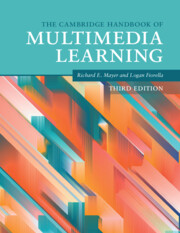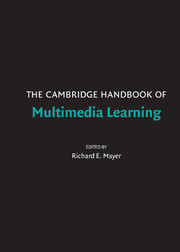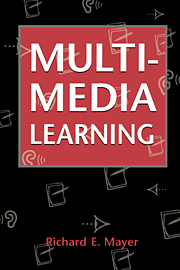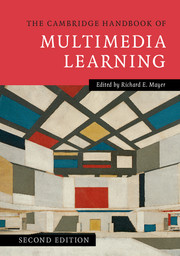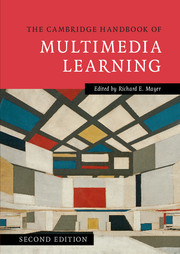The Cambridge Handbook of Multimedia Learning
Digital and online learning is more prevalent than ever, making multimedia learning a primary objective for many instructors. The Cambridge Handbook of Multimedia Learning examines cutting-edge research to guide creative teaching methods in online classrooms and training. Recognized as the field's major reference work, this research-based handbook helps define and shape this area of study. This third edition provides the latest progress report from the world's leading multimedia researchers, with forty-six chapters on how to help people learn from words and pictures, particularly in computer-based environments. The chapters demonstrate what works best and establishes optimized practices. It systematically examines well-researched principles of effective multimedia instruction and pinpoints exactly why certain practices succeed by isolating the boundary conditions. The volume is founded upon research findings in learning theory, giving it an informed perspective in explaining precisely how effective teaching practices achieve their goals or fail to engage.
- Provides an up-to-date review of what is known about how to design multimedia instruction
- Presents evidence-based theories on how people learn from words and graphics
- Features a diverse collection of chapters written by leading researchers from around the world
- Supplies a systematic structure for organizing the research base in multimedia learning
- Lays out both practical and theoretical implications, as well as recommendations for future research
Reviews & endorsements
'Multimedia is a core foundation of digital learning in the twenty-first century. Developers of learning environments need to make dozens of decisions on what media to use and how they are integrated with content and pedagogy. This Handbook covers the systematic research and science-based principles to guide these decisions.' Art Graesser, Distinguished University Professor of Interdisciplinary Research, University of Memphis, USA
'This third edition is a treasure trove of the latest research and insights on how students learn from multiple types of sources, including text, images, games, artificial agents, animations, or virtual reality. Mayer and Fiorella provide the perfect resource to discover or rediscover today's literature on learning.' Danielle McNamara, Director of the Science of Learning and Educational Technology (SoLET) Laboratory, Arizona State University, USA
'Mayer and Fiorella provide an authoritative guide to best practices in designing multimedia learning. Learning of this kind is central to modern education and has been evolving at a rapid pace. Researchers, educators, and curriculum developers will all benefit from reading this valuable Handbook in the updated third edition.' Nora S. Newcombe, Laura H. Carnell Professor of Psychology, Temple University, USA
'This Handbook provides an excellent analysis and synthesis of the important research on multimedia learning. The editors have done a marvelous job of bringing together virtually everything a researcher, teacher, or student needs to know about learning using multiple media. I recommend the Handbook most highly.' Robert J. Sternberg, Professor of Human Development, Cornell University, USA
Product details
No date availablePaperback
9781108814669
628 pages
279 × 215 × 33 mm
1.54kg
Table of Contents
- Part I. Background:
- 1. Introduction to Multimedia Learning
- 2. Foundations of Multimedia Learning
- 3. Fifteen common but questionable principles of Multimedia Learning
- 4. Research methods in Multimedia Learning
- Part II. Theoretical Foundations:
- 5. Cognitive theory of Multimedia Learning
- 6. Implications of cognitive load theory for Multimedia Learning
- 7. Integrated model of text and picture comprehension
- 8. The four component Instructional Design Model for Multimedia Learning
- 9. Motivation and affect in Multimedia Learning
- 10. Metacognition in Multimedia Learning
- Part III. Basic Principles of Multimedia Learning:
- 11. The Multimedia Principle
- 12. The multiple representation principle in Multimedia Learning
- 13. The expertise reversal principle in Multimedia Learning
- Part IV. Principles for Reducing Extraneous Processing in Multimedia Learning:
- 14. Principles for reducing extraneous processing in Multimedia Learning: Coherence, signaling, redundancy, spatial contiguity, and temporal contiguity principles
- 15. The split attention principle in Multimedia Learning
- 16. The redundancy principle in Multimedia Learning
- 17. The Signaling (or cueing) principle in Multimedia Learning
- 18. The worked example principle in Multimedia Learning
- 19. Principles for managing essential processing in Multimedia Learning: Segmenting, pre-training, and Modality principles
- 20. The Modality principle in Multimedia Learning
- 21. The Transient information principle in Multimedia Learning
- Part VI. Principles Based on Social and Affective Features of Multimedia Learning:
- 22. Principles Based on Social Cues in Multimedia Learning: Personalization, voice, embodiment, and image Principles
- 23. The embodiment principle in Multimedia Learning
- 24. The immersion principle in Multimedia Learning
- 25. The Collaboration principle in Multimedia Learning
- 26. The animation composition principle in Multimedia Learning
- 27. The Emotional Design principle in Multimedia Learning
- Part VII. Principles Based on Generative Activity in Multimedia Learning:
- 28. The Generative Activity principle in Multimedia Learning
- 29. The Mapping principle in Multimedia Learning
- 30. The Drawing principle in Multimedia Learning
- 31. The Imagination principle in Multimedia Learning
- 32. The Self-Explanation principle in Multimedia Learning
- 33. The Guided Inquiry principle in Multimedia Learning
- 34. The Feedback principle in Multimedia Learning
- 35. The Learner Control principle in Multimedia Learning
- 36. The Cognitive Load Self-Management principle in Multimedia Learning
- Part VIII. Multimedia Learning with Media:
- 37. Multimedia Learning with online cognitive tutors
- 38. Multimedia Learning with Animated Pedagogical agents
- 39. Multimedia Learning with simulations and microworlds
- 40. Multimedia Learning with Computer games
- 41. Multimedia Learning with Instructional video
- 41. Multimedia Learning with Instructional video Logan Fiorella
- 42. Multimedia Learning in Virtual and Mixed reality
- 43. Multimedia Learning with Visual displays
- 44. Multimedia Learning from multiple documents
- 45. Multimedia Learning in e-Courses
- 46. Principles for educational assessment with Multimedia.

